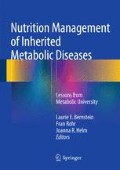Abstract
-
Glycogen storage disease types 1a and 1b (GSD-1) are characterized by fasting hypoglycemia and elevated lactic acid, uric acid, cholesterol, and triglycerides. Patients with GSD type 1b are also at risk of neutropenia and inflammatory bowel disease.
-
Nutrition management of GSD-1 includes providing supplemental uncooked cornstarch as a source of glucose, avoidance of dietary galactose and fructose, and a moderate restriction of fat.
-
Depending on age, overnight continuous feeding or uncooked cornstarch feedings every 4–6 h are necessary to prevent hypoglycemia during the night.
-
Frequent home monitoring of blood glucose and adjustments in the diet are needed to prevent hypoglycemia and maintain blood glucose >70 mg/dL or 4 mmol/L.
Access this chapter
Tax calculation will be finalised at checkout
Purchases are for personal use only
References
Berg JM, Tymoczko JL, Stryer L. Biochemistry. 7th ed. New York: W.H. Freeman; 2012. xxxii, 1054, 43, 41, 48 p.
Kishnani PS, et al. Diagnosis and management of glycogen storage disease type 1: a practical guideline of the American College of Medical Genetics and Genomics. Genet Med. 2014;16:e1–e29.
Laforê P, et al. The glycogen storage diseases and related disorders. In: Inborn Metabolic Diseases, 5th ed. Saudubray JM, van den Berghe G, Walter JH editors. Berlin Heidelberg: Springer/Medizin; 2012. p. 115–21.
Rake JP, et al. Guidelines for management of glycogen storage disease type I – European Study Group on Glycogen Storage Disease Type I (ESGSD I). Eur J Pediatr. 2002;161 Suppl 1:S112–9.
Sidbury JB, Chen YT, Roe CR. The role of raw starches in the treatment of type I glycogenosis. Arch Intern Med. 1986;146(2):370–3.
Santer R et al. Disorders of carbohydrate metabolism and glucose transport. In: Physician’s guide to diagnosis, treatment and follow-up of inherited metabolic disease. Blau N et al (editors), 2014; p 265–301.
Nalin T, et al. In vitro digestion of starches in a dynamic gastrointestinal model: an innovative study to optimize dietary management of patients with hepatic glycogen storage diseases. J Inherit Metab Dis. 2014. doi: 10.107/s10545-014-9763-y.
Institute of Medicine (U.S.), Panel on Macronutrients. Standing Committee on the Scientific Evaluation of Dietary Reference Intakes. Dietary reference intakes for energy, carbohydrate, fiber, fat, fatty acids, cholesterol, protein, and amino acids. Washington, DC: National Academies Press; 2005. xxv, 1331 p.
Ross K. Glycogen storage disease type 1: sucrose, fructose, galactose free diet. Cited 10 Nov 2014; Available from: https://ufhealth.org/sites/default/files/media/PDF/General20Nutrition20Guidelines20For 20Glycogen20Storage20Disease20Type20I- 20Sucrose2C20Fructose2C20Galactose20Free 20Diet.pdf.
Shah KK, O’Dell SD. Effect of dietary interventions in the maintenance of normoglycaemia in glycogen storage disease type 1a: a systematic review and meta-analysis. J Hum Nutr Diet. 2013;26(4):329–39.
Derks TG, et al. Dietary treatment of glycogen storage disease type Ia: uncooked cornstarch and/or continuous nocturnal gastric drip-feeding? Mol Genet Metab. 2013;109(1):1–2.
Correia CE, et al. Use of modified cornstarch therapy to extend fasting in glycogen storage disease types Ia and Ib. Am J Clin Nutr. 2008;88(5):1272–6.
Nagasaka H, et al. Improvements of hypertriglyceridemia and hyperlacticemia in Japanese children with glycogen storage disease type Ia by medium-chain triglyceride milk. Eur J Pediatr. 2007;166(10):1009–16.
Das AM, et al. Glycogen storage disease type 1: impact of medium-chain triglycerides on metabolic control and growth. Ann Nutr Metab. 2010;56(3):225–32.
Van Hove JL, et al. Acute nutrition management in the prevention of metabolic illness: a practical approach with glucose polymers. Mol Genet Metab. 2009;97(1):1–3.
Martens DH, et al. Pregnancies in glycogen storage disease type Ia. Am J Obstet Gynecol. 2008;198(6):646.e1–7.
White FJ, Jones SA. The use of continuous glucose monitoring in the practical management of glycogen storage disorders. J Inherit Metab Dis. 2011;34(3):631–42.
Däublin G, Schwahn B, Wendel U. Type I glycogen storage disease: favourable outcome on a strict management regimen avoiding increased lactate production during childhood and adolescence. Eur J Pediatr. 2002;161 Suppl 1:S40–5.
Saunders AC, et al. Clinical evaluation of a portable lactate meter in type I glycogen storage disease. J Inherit Metab Dis. 2005;28(5):695–701.
Melis D, et al. Impaired bone metabolism in glycogen storage disease type 1 is associated with poor metabolic control in type 1a and with granulocyte colony-stimulating factor therapy in type 1b. Horm Paediatr. 2014;81(1):55–62.
Boers SJ, et al. Liver transplantation in glycogen storage disease type I. Orphanet J Rare Dis. 2014;9:47.
Reddy SK, et al. Liver transplantation for glycogen storage disease type Ia. J Hepatol. 2009;51(3):483–90.
Ribes-Koninckx C, et al. Clinical outcome of hepatocyte transplantation in four pediatric patients with inherited metabolic diseases. Cell Transplant. 2012;21(10):2267–82.
Author information
Authors and Affiliations
Corresponding author
Editor information
Editors and Affiliations
Rights and permissions
Copyright information
© 2015 Springer International Publishing Switzerland
About this chapter
Cite this chapter
van Calcar, S. (2015). Nutrition Management of Glycogen Storage Disease Type 1. In: Bernstein, L., Rohr, F., Helm, J. (eds) Nutrition Management of Inherited Metabolic Diseases. Springer, Cham. https://doi.org/10.1007/978-3-319-14621-8_27
Download citation
DOI: https://doi.org/10.1007/978-3-319-14621-8_27
Publisher Name: Springer, Cham
Print ISBN: 978-3-319-14620-1
Online ISBN: 978-3-319-14621-8
eBook Packages: MedicineMedicine (R0)

